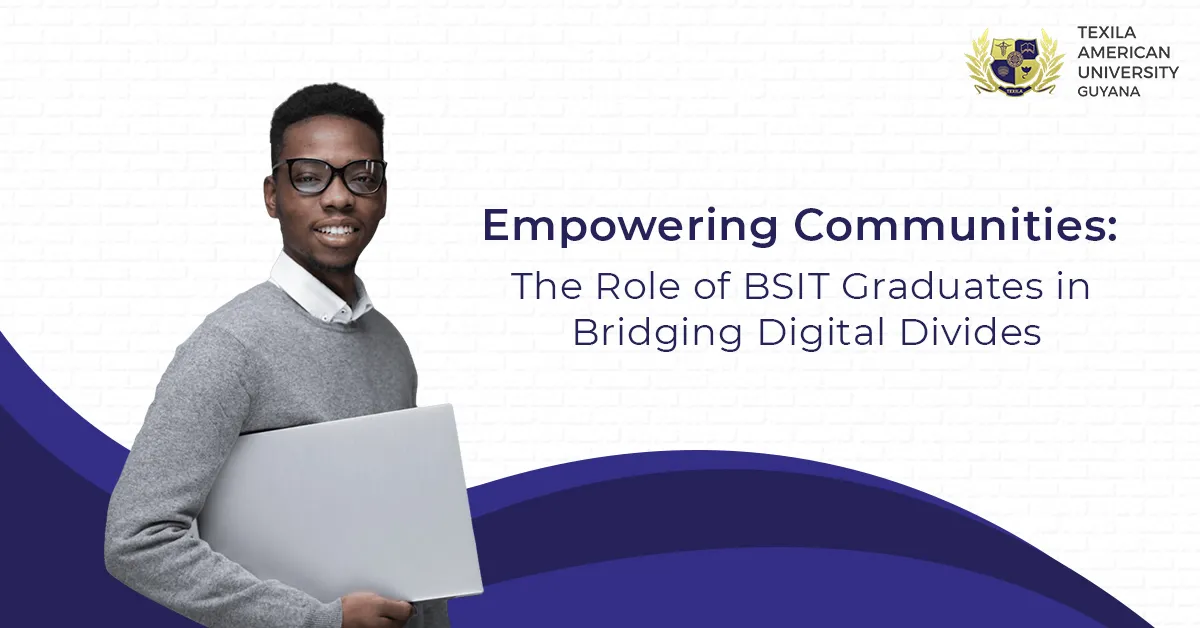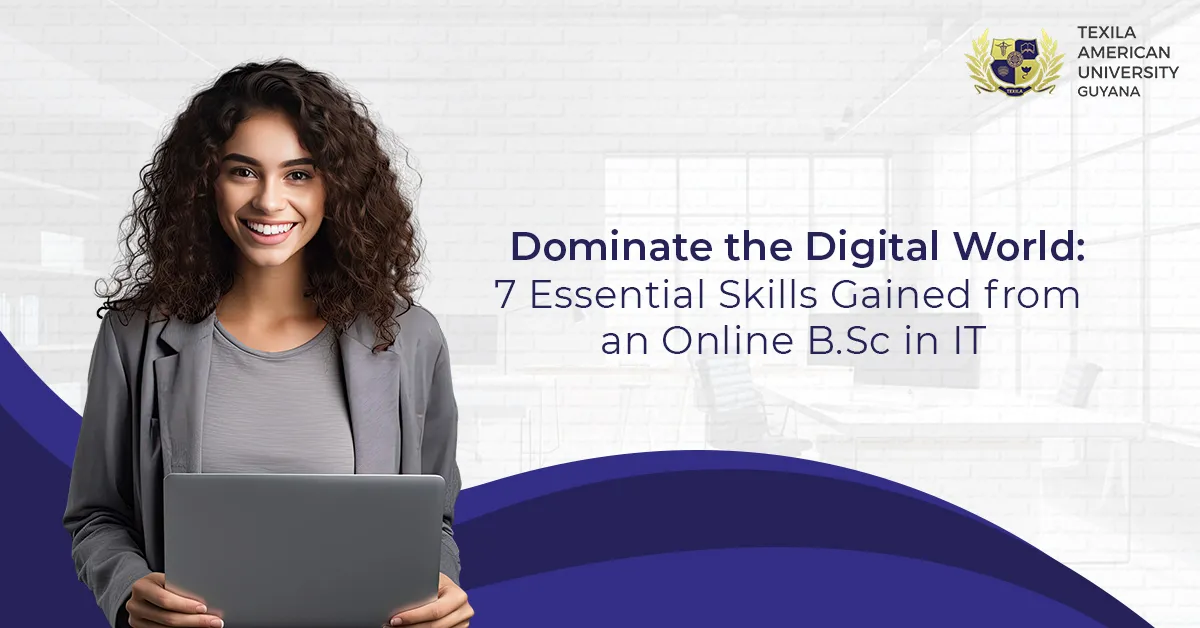Mastering a Bachelor of Science (B.Sc.) in Information Technology online involves strategic planning and proactive engagement in various aspects of the program. Choosing the right program, setting clear goals, leveraging online resources, building a solid foundation, engaging with faculty and peers, seeking practical experience, staying current with industry trends, and preparing for career advancement are essential steps to harnessing your potential in IT. By following these strategic moves, individuals can acquire the knowledge, skills, and experience needed to excel in the dynamic and competitive field of information technology.
Introduction
Unlock your potential and elevate your career with an online Bachelor of Science (B.Sc.) in Information Technology (IT). In today’s digital age, IT professionals play a crucial role in driving innovation, solving complex problems, and shaping the future of technology. Pursuing a B.Sc. in IT online offers a flexible and convenient way to acquire the knowledge, skills, and credentials needed to excel in this dynamic field.
Whether you are a working professional looking to advance your career or a recent high school graduate eager to enter the tech industry, mastering a B.Sc. in IT online can set you on the path to success. This comprehensive guide explores eight strategic moves to harness your potential and master a B.Sc. in Information Technology online, empowering you to thrive in the digital economy.
Choose the Right Program
- Accreditation and Reputation: Select a BSc Information Technology program accredited by reputable organizations. This ensures that the curriculum meets industry standards and enhances the credibility of your degree.
- Curriculum and Specializations: Evaluate the program’s curriculum and specializations to align with your career goals and interests, whether in cybersecurity, software development, data analytics, or network administration.
- Delivery Format and Flexibility: Consider the program’s delivery format, including asynchronous or synchronous learning options, to ensure compatibility with your schedule and preferred learning style.
Choosing the right B.Sc. in IT program is essential for laying a solid foundation for your career in information technology.
Set Clear Goals
- Career Aspirations: Define your long-term career goals in IT, such as becoming a software engineer, cybersecurity analyst, database administrator, or IT project manager.
- Skill Development: Identify the specific technical skills and competencies you aim to develop through the B.Sc. in IT program, such as programming languages, database management, cloud computing, or cybersecurity.
- Professional Certifications: Determine if there are any industry certifications or credentials you wish to pursue alongside your BSc Information Technology Degree, enhancing your qualifications and marketability in the job market.
Setting clear goals helps you stay focused and motivated throughout your B.Sc. in IT journey, guiding your academic and career decisions.
Leverage Online Resources
- Virtual Labs and Simulations: Take advantage of virtual labs and simulations offered by the online program to gain hands-on experience with IT tools, software, and systems in a simulated environment.
- Online Tutorials and Courses: Supplement your learning with online tutorials, courses, and resources available on Coursera, edX, or Udemy, covering a wide range of IT topics and technologies.
- Open-Source Projects: Participate in open-source projects and online communities to collaborate with peers, contribute to real-world projects, and expand your practical experience in IT.
Online resources provide valuable supplementary learning opportunities to enhance your understanding and proficiency in information technology.
Build a Strong Foundation
- Fundamental Concepts: Learn the basics of IT, like how computers work, operating systems, and data is organized. You’ll also learn about algorithms and networking, which will help you with more advanced studies later.
- Programming Skills: Develop proficiency in programming languages commonly used in IT, such as Python, Java, C++, or JavaScript, acquiring essential coding skills for software development and problem-solving.
- Database Management: Gain expertise in database management systems (DBMS), SQL query languages, and data modelling techniques essential for storing, retrieving, and analyzing data in IT applications.
Building a solid foundation in critical areas of IT ensures that you have the knowledge and skills needed to tackle advanced coursework and real-world challenges.
Engage with Faculty and Peers
- Faculty Interaction: Actively engage with faculty members through online discussions, office hours, and virtual meetings to seek guidance, ask questions, and receive feedback on your coursework and projects.
- Peer Collaboration: Collaborate with peers on group projects, assignments, and study groups, leveraging diverse perspectives and collective expertise to enhance learning and problem-solving.
- Professional Networking: Participate in virtual networking events, webinars, and industry forums organized by the online program to connect with professionals with bachelor’s degrees in information technology, alums, and potential employers.
Engaging with faculty and peers fosters a supportive learning environment and expands your professional network in information technology.
Seek Practical Experience
- Internships and Co-op Programs: Explore internship or cooperative education (co-op) opportunities with IT companies, government agencies, or nonprofit organizations to gain practical experience and apply classroom knowledge in real-world settings.
- Freelance Projects: Take on freelance or consulting projects in IT-related areas such as web development, software testing, cybersecurity, or IT support, building your portfolio and highlighting your skills to potential employers.
- Volunteer Work: Volunteer for IT-related projects or initiatives in your community, such as teaching coding workshops, designing websites for local businesses, or providing tech support to nonprofit organizations to gain hands-on experience while making a positive impact.
Seeking practical experience outside the classroom enhances your employability and prepares you for success in the competitive field of information technology.
Stay Current with Industry Trends
- Continuous Learning: Stay updated on the latest trends, technologies, and developments in IT through online forums, industry publications, podcasts, and webinars, maintaining a mindset of continuous learning and professional growth.
- Certifications and Training: Pursue industry certifications and specialized training programs in emerging IT areas such as cloud computing, cybersecurity, artificial intelligence, or data science to enhance your skills and stay competitive in the job market.
- Professional Associations: Join IT professional associations and organizations, such as the Association for Computing Machinery (ACM) or the Institute of Electrical and Electronics Engineers (IEEE), to access resources, networking opportunities, and professional development events.
Staying current with industry trends ensures that you remain relevant and competitive in the ever-evolving field of information technology.
Prepare for Career Advancement
- Resume Building: Update your resume with relevant coursework, projects, internships, certifications, and skills acquired during your B.Sc. in the IT program, highlighting your qualifications and achievements to potential employers.
- Job Search Strategies: Develop effective job search strategies, including networking, online job boards, career fairs, and professional networking platforms like LinkedIn, to explore career opportunities and secure interviews for the Bachelor of Science in Information Technology Jobs.
- Interview Preparation: Practice interview techniques, prepare responses to common interview questions, and highlight your technical skills and problem-solving abilities during job interviews, demonstrating your readiness for entry-level IT positions or career advancement opportunities.
Preparing for career advancement positions you for success in the job market and helps you transition smoothly from academia to the workforce.
Conclusion
Mastering a Bachelor of Science (B.Sc.) in Information Technology online requires strategic planning, dedication, and a commitment to continuous learning and professional growth. By choosing the right program, setting clear goals, leveraging online resources, building a strong foundation, engaging with faculty and peers, seeking practical experience, staying current with industry trends, and preparing for career advancement, you can harness your potential and excel in information technology. Whether you aspire to become a software developer, cybersecurity analyst, IT consultant, or technology entrepreneur, mastering a B.Sc. in IT online can open doors to exciting career opportunities and pave the way for a successful and fulfilling career journey.
Forge Your Technological Triumph!
Craft a victorious journey through your online B.Sc. in Information Technology studies using 8 strategic maneuvers.
FAQs
What is a Bachelor of Science (B.Sc.) in Information Technology?
A Bachelor of Science (B.Sc.) in Information Technology is an undergraduate degree program that focuses on studying computer systems, networks, software development, database management, cybersecurity, and other areas related to information technology.
What are the benefits of pursuing a B.Sc. in Information Technology online?
Pursuing a B.Sc. in Information Technology online offers flexibility, convenience, access to various resources and learning opportunities, and the ability to balance education with professional and personal commitments.
How can I prepare for success in an online program for a B.Sc. in Information Technology?
Here are some things you can do to prepare for success in an online B.Sc. Information Technology program. Choosing the right program, setting clear goals, leveraging online resources, engaging with faculty and peers, seeking practical experience, staying current with industry trends, and preparing for career advancement are essential.
What career opportunities are available with a B.Sc. in Information Technology degree?
Graduates with a B.Sc. in Information Technology can pursue various career opportunities in software development, cybersecurity, network administration, database management, IT consulting, and technology entrepreneurship.
Can I pursue a B.Sc. in Information Technology online while working full-time?
Many online programs offer flexible scheduling options that allow individuals to pursue a B.Sc. in Information Technology while working full-time. Asynchronous learning formats and customizable study schedules make balancing education with professional commitments possible.












